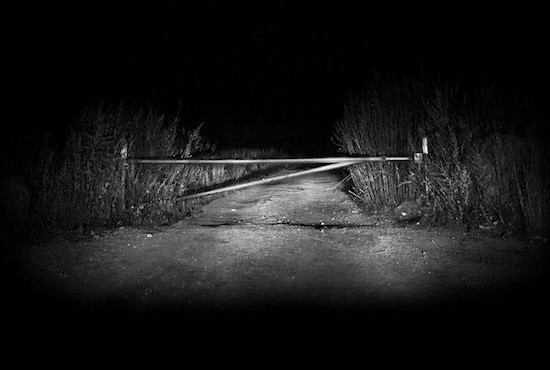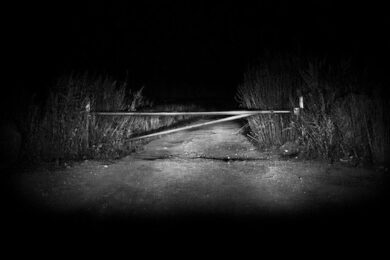When is a metal band not a metal band? As far as rhetorical questions go, it’s fairly innocuous (several rungs above ‘Does a bear shit in the woods?’, sure, but some way below ‘What is the sound of one hand clapping?’), but it’s one that Portland duo The Body have had us asking for almost two decades. The band’s transition from cult sludge metal oddballs to fearless genre-splicing auteurs has happened so steadily and organically that it’s easy to forget that, this time ten years ago, the pair had just one relatively straightforward album to their name. The past few years have seen a slo-mo explosion of creativity from The Body camp, with their minimal doom sound evolving into something altogether more extreme, drawing from industrial, hip-hop, techno, harsh noise, contemporary classical and anything else that found its way into the band’s collective imagination.
While most of their peers obsess over capturing a good representation of their live sound when they make a record, The Body have been using the studio as an instrument more and more with each release, culminating in their last album, 2016’s No One Deserves Happiness (described by the band as the “grossest pop album of all time”. I Have Fought Against It, But I Can’t Any Longer goes one step further: if No One… felt like The Body’s trademark sound placed within a new context, then I Have Fought Against It… burns that sound to the ground and builds something completely new out of the charred remains. It is constructed mostly of samples of their own work; guitarist Chip King and drummer Lee Buford don’t play their instruments at all, instead reconstituting previous recordings into one of their most startlingly confrontational records yet. But don’t call this a remix album: it feels very much like a fresh, fully fledged addition to their oeuvre, and the next logical chapter in the band’s story.
On a purely sonic level, this is the furthest The Body have strayed from metal’s confines so far. Riffs are stretched out into fizzing waves of spluttering noise or voraciously gutted until they’re just lingering husks of vast ominous low-end. There are only a couple of songs that put a distorted electric guitar up front in the mix, most of them towards the album’s latter half. Even then, songs like ‘An Urn’ smother the riffs in stuttering, militaristic boom-baps, placing them closer to martial industrial or even the last Death Grips record more than anything on the metal end of the spectrum. ‘Blessed Alone’ uses a doomy riff to incredible effect, building slowly out of sombre, acutely sad strings into one of the most powerful, destructive crescendos in the band’s discography, and there’s some jangly Shellac-esque chords and tinny-swarm-of-bees tremolo picking on ‘Sickly Heart Of Sand’, but for the most part the guitars are manipulated to the point that they’re unrecognisable.
It’s remarkable how heavy the whole thing still sounds, though. ‘The West Has Failed’, for example, pairs jilted trap rhythms with some of Chip’s harshest and most painful-sounding screams, bounding along with a gleefully obnoxious stomp until an unexpected dub break crashes in out of nowhere, complete with undulating bass frequencies, twinkling space echo and even an artfully deployed Eek-A-Mouse sample. ‘Partly Alive’ blares colossal detuned horns over rumbling cut-up percussion, almost like the missing link between Laibach and Keith Fullerton Whitman. ‘Nothing Stirs’, meanwhile, creates an unbelievably oppressive atmosphere using little more than stark electronic thuds and sumptuous swelling pads, whilst Lingua Ignota’s Kristin Hayter sends a chill down the spine as her regal falsetto cracks into an uninhibitedly violent roar. In fact, this album is easily their most vocally diverse so far. On previous records, Chips’ distinctively piercing shriek has contrasted with the ethereal croon of Assembly Of Light Choir’s Chrissy Wolpert to powerful effect; but on I Have Fought Against It…, with Hater’s wide-eyed howl, croaky rasps from Sandworm’s Ben Eberle and Uniform frontman Michael Berdan’s drunken bellow, The Body paint with a much broader palette and sacrifice none of their own identity.
The Body have always had more emotional depth than a cursory glance at their T-shirt designs would have you believe, but this album is arguably the most articulate and nuanced representation of the human condition that they’ve offered up yet. Whilst some sludge metal bands are content to portray a cartoonishly exaggerated vision of negativity and depression for their whole careers, The Body have always seemed to dig deeper into these feelings and the small galaxies of conflicting emotions that usually orbit them.
Take that title, for instance. I Have Fought Against It, But I Can’t Any Longer, an arresting phrase that’s barked mantra-like by Hayter on the album’s unflinching apex, ‘Sickly Heart Of Sand’. On the first impression, it appears to be an admission of defeat, a callous suicide note for a bleak, uncaring world. But it doesn’t have to be. For someone fighting to keep themselves in an uncomfortable situation, be it a job, relationship or mind frame, the admission that they are no longer acting with their best interests in mind can be an extremely positive revelation and something of a breakthrough. In many ways, that’s what this record seems to represent: that moment of visceral, unshakeable clarity that grips you in your lowest hour, that desperate but empowering sense of determination when you finally admit to yourself that your life is not where you want it to be, but you now know what you need to do to change it.
It’s a difficult feeling to put in to words, but one that The Body have captured with uncanny precision as the sombre, hopeless strains of ‘The Last Form Of Loving’ suddenly transition into ‘Can Carry No Weight’, its distant four-on-the-floor thump, haunting chanted vocals and swathes of cold feedback stopping you dead in your tracks like that flood of endorphins that accompanies your first big cry after months of stoic, steely-faced struggle. The Body’s portrayal of sadness on this record is simply one of the most mature and well-realised in metal today, examining the conflicting shades of heartbreak, listlessness and even fleeting joy that can become embroiled in depressive episodes, making a lot of their contemporaries sound merely angsty and one-dimensional.
So, just when is a metal band not a metal band? Despite shedding metal’s generic trappings almost completely, The Body have created some of the heaviest and most intense music we’ve heard this year, a devastating multi-faceted gut-punch of a record that asks you to come face to face your most primordial, deep-seated fears, acknowledge and accept your failings and emerge from the experience a stronger person. And if that’s not metal, then frankly, we don’t know what is.



